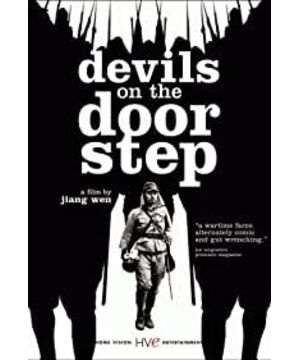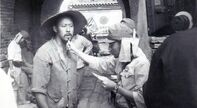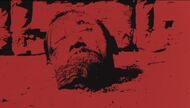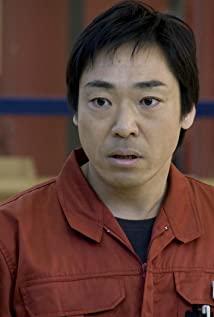From "Sunny Day" in 1993 to "The Devil Is Coming" in 2000, Jiang Wen dormant for seven years. His films demand quality but not quantity, and each one is solid. This time, he chose "Survival" by Shandong writer You Fengxiang, which reflects the story of Jiaonan farmers resisting the Japanese, while Jiang Wen changed the location to his hometown, Tangshan, so the folks headed by Ma Dasan said Qianxi dialect. Of course, there is still a big controversy between the original author and the screenwriter for the adaptation of this film. Part of the controversy is reflected in the review response of the State Administration of Radio, Film and Television. Subversive. Therefore, the radio and television ordered Jiang Wen to modify, but the latter was not obedient this time, and took the film to Cannes to compete, and won the jury award. The result was that the film could not be released, and the film could not be produced for 5 years. This cost should be said to be huge. But Jiang Wen did not sacrifice. Eighteen years later, if you re-examine this anti-Japanese drama, you will find that it and other anti-Japanese dramas are not at all in a historical perspective. It considers more of human nature, which makes this anti-Japanese drama so special.
1
In fact, when the "I" threw the Japanese captives and translators to Ma Dasan, this contradiction began to intensify within the villagers, so that all kinds of people showed the characteristics of Chinese people, and the village chief was in charge of the overall situation. , But with reservations. Crazy Dad said he wanted one with each hand, pinch it to death, dig the hole and bury it, no one cares about it. The other villagers are only considering their own interests, their words are fierce, and they are actually evasive. Everyone can find a good reason to protect themselves, and then let Ma Dasan carry the pot. In this, Ma Dasan also described his own affairs as the affairs of the whole village, and exchanged all kinds of sympathy and help for his personal affair with Yu Er. He learned a little bit about the idea of acquiring Japanese captives from the distorted translation by the translator, and then slowly solved the problem in his own way. He once asked for advice on the so-called swordsman, but the result was a self-deception scam. He also took the risk of taking the captives in exchange for food, but he never expected to bring disaster to the whole village. Therefore, in the end, he chose to rush into the prison camp, but was arranged by the Kuomintang chief to be killed by the Japanese. When his head rolled and blood splattered, he suddenly realized that what he didn't understand was not war, but also the humanity alienated by war.
2
The controversial point of this movie is that Jiang Wen chose a relatively Rashomon approach, which gave the Japanese a more normal perspective. This is also the reason why the film has received repeated acclaim in Japan but has been criticized in China. However, Jiang Wen later talked about his motives for taking pictures of devils. He also met Japanese students while studying in Chinese opera. He would also get in touch with these people up close. He felt that these people are ordinary people who can socialize. But how could ordinary people suddenly pick up guns during the war and commit so many tragic massacres? There must be something wrong in the middle. He said that he was very disgusted by certain domestic voices who always said that a small group of Japanese far-right militarists were not a small group at all, but a large part of them. That is why they caused such great harm in the war. This is the deep meaning behind the national character of chrysanthemum and sword.
3
Jiang Wen, who came out as a child of Gen Zhengmiao Hongdayuan, when he was 37 years old, he wanted to make this film in fact, hoping to warn the people of the country. We must first dare to face our own inferior roots, and at the same time see through the hypocrisy of the other party, in order to make progress. Jiang Wen is not Lu Xun, but those who have really lived in Japan in the latter understand the terrible nature of this nation better, and thus grieve for our people's misfortune. Therefore, although the devil came and was banned, the topics involved are still filled with righteous indignation among compatriots. Jiang Wen said that many anti-Japanese dramas filmed in China will be taken back to Japan by Japanese people with ulterior motives, so as to educate their children and grandchildren about the blows our soldiers have suffered in China, and cooperate with Japanese textbooks that have been distorted and tampered with. People have received the education of false view of history since they were young. In our anti-Japanese drama, all people are soldiers at every turn, so the Japanese far-right forces can also use the topic to say, you see that we killed not civilians but soldiers at the time, so as to find excuses to excuse ourselves. The repeated seeing of this stupid and exploited reality also forced Jiang Wen to make a film that made the world examine the atrocities of the Japanese aggressors as soon as possible, and at the same time aroused national vigilance.
4
The devil is here, devils on the doorstep used 480,000 rolls of film to exceed 30% of the investment. Jiang Wen forced Gu Changwei to choose black and white photography. On the surface, this is an anti-Japanese themed work, but in fact its practical significance is indeed thought-provoking. . It used the ban to lift a lot of doubts about the anti-Japanese drama. Because of those doubts, Zhitong distorted history and brainwashed propaganda that did not conform to objective laws. Only by piercing this layer of paper will the people realize the danger. Don't always feel that it is terrible. It is just a bluff. Once faced with the real confrontation on various fronts, Jiang Wen's precious foresight will be discovered. As a director, Jiang Wen has put in this film no less than a sunny day. If the latter photographed his dream of growing up, then the former photographed his reflection on his worries. How many Ma Juniors in China are there until the last moment before they know how to pick up a knife? And at that time, is it too late?
PS: Jiang Wen’s metaphors are indeed very profound, such as horses and donkeys, roosters, sugar, etc., they have a lot of information
If you want to watch it, you can also go to the official account : VIP Big Film and Television Circle to see what you think of this movie. Update every day in time, and there are more blockbusters here!
View more about Devils on the Doorstep reviews










